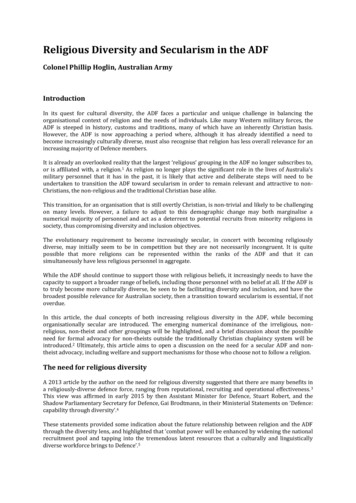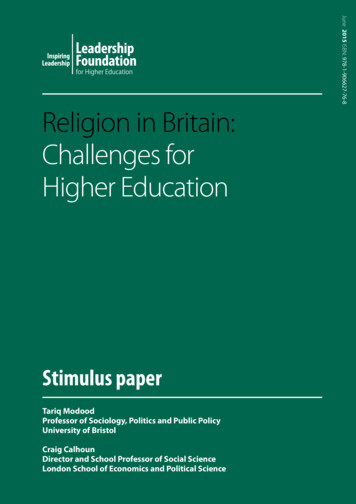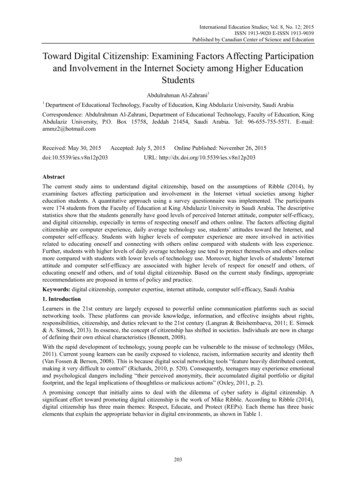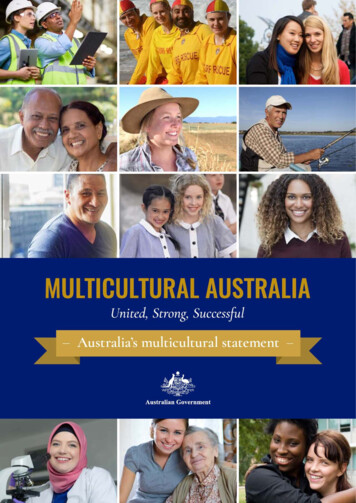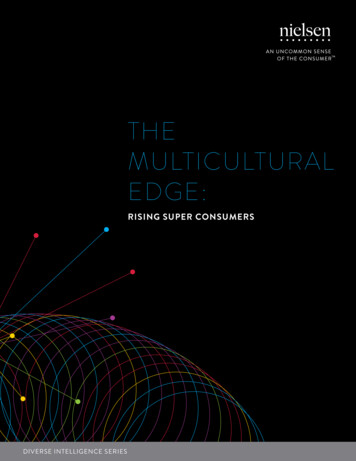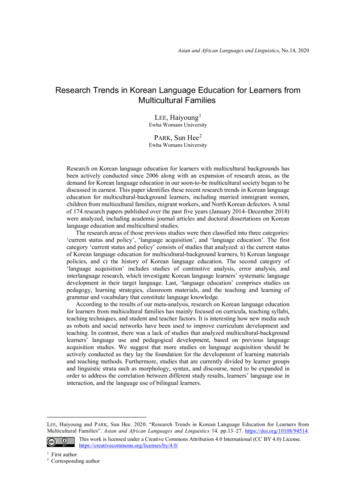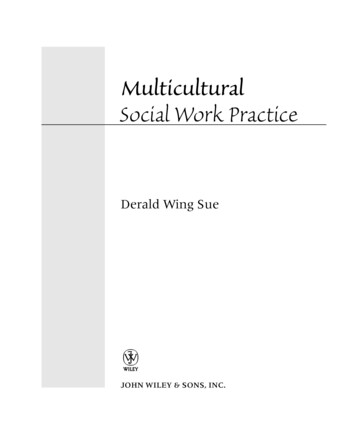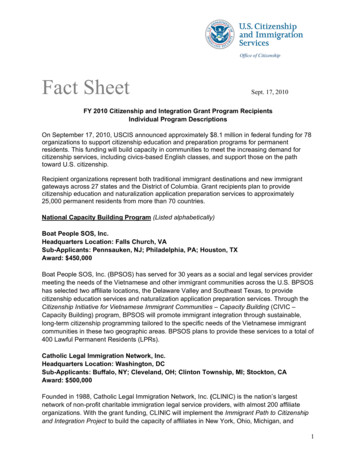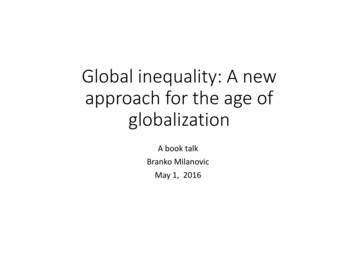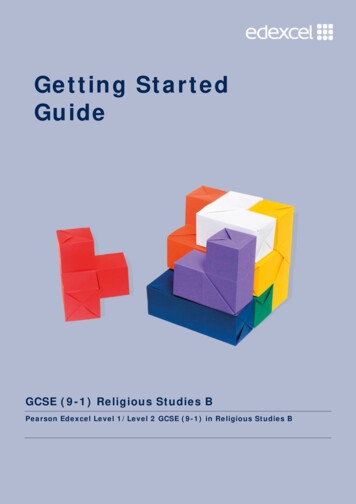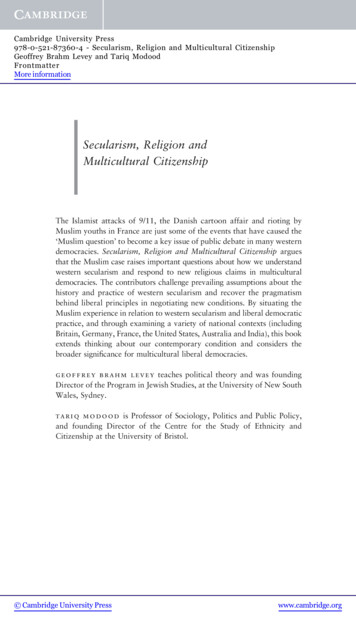
Transcription
Cambridge University Press978-0-521-87360-4 - Secularism, Religion and Multicultural CitizenshipGeoffrey Brahm Levey and Tariq ModoodFrontmatterMore informationSecularism, Religion andMulticultural CitizenshipThe Islamist attacks of 9/11, the Danish cartoon affair and rioting byMuslim youths in France are just some of the events that have caused the‘Muslim question’ to become a key issue of public debate in many westerndemocracies. Secularism, Religion and Multicultural Citizenship arguesthat the Muslim case raises important questions about how we understandwestern secularism and respond to new religious claims in multiculturaldemocracies. The contributors challenge prevailing assumptions about thehistory and practice of western secularism and recover the pragmatismbehind liberal principles in negotiating new conditions. By situating theMuslim experience in relation to western secularism and liberal democraticpractice, and through examining a variety of national contexts (includingBritain, Germany, France, the United States, Australia and India), this bookextends thinking about our contemporary condition and considers thebroader significance for multicultural liberal democracies.g e o f f r e y b r a h m l e v e y teaches political theory and was foundingDirector of the Program in Jewish Studies, at the University of New SouthWales, Sydney.t a r i q m o d o o d is Professor of Sociology, Politics and Public Policy,and founding Director of the Centre for the Study of Ethnicity andCitizenship at the University of Bristol. Cambridge University Presswww.cambridge.org
Cambridge University Press978-0-521-87360-4 - Secularism, Religion and Multicultural CitizenshipGeoffrey Brahm Levey and Tariq ModoodFrontmatterMore informationSecularism, Religion andMulticultural Citizenshipgeoffrey brahm levey andtariq modoodforeword by charles taylor Cambridge University Presswww.cambridge.org
Cambridge University Press978-0-521-87360-4 - Secularism, Religion and Multicultural CitizenshipGeoffrey Brahm Levey and Tariq ModoodFrontmatterMore informationcambridge university pressCambridge, New York, Melbourne, Madrid, Cape Town, Singapore, S ao Paulo, DelhiCambridge University PressThe Edinburgh Building, Cambridge CB2 8RU, UKPublished in the United States of America by Cambridge University Press, New Yorkwww.cambridge.orgInformation on this title: www.cambridge.org/9780521695411Ó Cambridge University Press 2009This publication is in copyright. Subject to statutory exceptionand to the provisions of relevant collective licensing agreements,no reproduction of any part may take place withoutthe written permission of Cambridge University Press.First published 2009Printed in the United Kingdom at the University Press, CambridgeA catalogue record for this publication is available from the British LibraryLibrary of Congress Cataloguing in Publication dataSecularism, religion, and multicultural citizenship / [edited by] Geoffrey Brahm Levey,Tariq Modood.p. cm.Includes bibliographical references and index.ISBN 978-0-521-87360-4 (hardback) – ISBN 978-0-521-69541-1 (pbk.)1. Secularism. 2. Multiculturalism. 3. Religious pluralism. 4. Islam–Relations.I. Levey, Geoffrey Brahm. II. Modood, Tariq. III. Title.BL2747.8.S345 20083220 .1–dc222008031152ISBN 978-0-521-87360-4 hardbackISBN 978-0-521-69541-1 paperbackCambridge University Press has no responsibility for the persistence oraccuracy of URLs for external or third-party internet websites referred toin this publication, and does not guarantee that any content on suchwebsites is, or will remain, accurate or appropriate. Cambridge University Presswww.cambridge.org
Cambridge University Press978-0-521-87360-4 - Secularism, Religion and Multicultural CitizenshipGeoffrey Brahm Levey and Tariq ModoodFrontmatterMore informationContentsList of tablespage viiList of contributorsForeword. What is secularism?ch ar l es t ay lo rAcknowledgements1Secularism and religion in a multicultural ageg eo ff re y b r ah m le ve yPart I23456Debating secularismThe shallow legitimacy of secular liberal orders: thecase of early modern Brandenburg-Prussiaian hunterFrance on the knife-edge of religion: commemoratingthe centenary of the law of 9 December 1905 on theseparation of church and statedavid saundersPolitical secularism: why it is needed and what can belearnt from its Indian versionrajeev bhargavaviiixixxiii125275682Secularism, public reason or moderately agonisticdemocracy?veit bader110Part IISecularism and multicultural citizenship137Immigration and the new religious pluralism: a EuropeanUnion–United States comparisonjosé c a s a n o v a139v Cambridge University Presswww.cambridge.org
Cambridge University Press978-0-521-87360-4 - Secularism, Religion and Multicultural CitizenshipGeoffrey Brahm Levey and Tariq ModoodFrontmatterMore informationviContents7Muslims, religious equality and secularismt ar i q m od o o d1648Contemporary politics of secularisms . s ay y i d1869Muslims in the West and their attitudes to fullparticipation in western societies: some reflectionsabdullah saeed20010 Liberal democracy, multicultural citizenship andthe Danish cartoon affairg e o f f r e y b r a h m le v e y a n d t a r i q m o d o o d216References243Index267 Cambridge University Presswww.cambridge.org
Cambridge University Press978-0-521-87360-4 - Secularism, Religion and Multicultural CitizenshipGeoffrey Brahm Levey and Tariq ModoodFrontmatterMore informationTables4.1 Church–state relations: theocracies and state religions page 864.2 Church–state relations: theocracies, state religionsand secular states894.3 Features of a secular state914.4 Church–state relations in three types of secular state924.5 Indian secularism compared with other types ofsecular states1027.1 Religion vis-à-vis state and civil society in threecountries178vii Cambridge University Presswww.cambridge.org
Cambridge University Press978-0-521-87360-4 - Secularism, Religion and Multicultural CitizenshipGeoffrey Brahm Levey and Tariq ModoodFrontmatterMore informationContributorsve it bader is Professor of Sociology and of Social and PoliticalPhilosophy at the University of Amsterdam, and a member of the Institute for Migration and Ethnic Studies. He is the author of numerousarticles on religious diversity, cultural identity and associative democracy, and of Secularism or Democracy? Associational Governance ofReligious Diversity (2007); editor of Religious Pluralism, Politics,and the State – a special volume of Ethical Theory and Moral Practice(2003) – and Citizenship and Exclusion (1997), and coeditor ofAssociative Democracy: The Real Third Way? – a special volume ofCritical Review of International Social and Political Philosophy (2001).raje ev bharg ava is Professor and Director of the Centre for theStudy of Developing Societies, Delhi. His main fields include politicaltheory, the history of political thought and the philosophy of socialscience. He is editor of Secularism and Its Critics (1998); coeditor ofMulticulturalism, Liberalism and Democracy (1999) and of CivilSociety, Public Sphere and Citizenship: Dialogues and Perceptions(2005); and author of Individualism in Social Science (1992).josé c as an o va is Professor of Sociology and Senior Fellow in theBerkeley Center for Religion, Peace, and World Affairs at GeorgetownUniversity, Washington DC. He was previously Professor of Sociologyat the New School for Social Research, New York, from 1987 to2007. His research focuses on religion, democratisation and socialchange in Latin America, Southern Europe and Eastern Europe. Hispublications include The Opus Dei and the Modernization of Spain(Cambridge, forthcoming), and Public Religions in the Modern World(1994).ian hu n ter is an Australian Professorial Fellow at the Universityof Queensland, Brisbane. He works on early modern political,philosophical and religious thought. His most recent monograph isviii Cambridge University Presswww.cambridge.org
Cambridge University Press978-0-521-87360-4 - Secularism, Religion and Multicultural CitizenshipGeoffrey Brahm Levey and Tariq ModoodFrontmatterMore informationList of ContributorsixRival Enlightenments: Civil and Metaphysical Philosophy in EarlyModern Germany (Cambridge, 2001). With David Saunders, he hasedited Natural Law and Civil Sovereignty: Moral Right and StateAuthority in Early Modern Political Thought (2002). He and DavidSaunders have also completed a new edition of Andrew Tooke’s firstEnglish translation of Samuel Pufendorf’s De officio hominis et civis:The Whole Duty of Man (2003).g eo ff re y br a hm le ve y teaches political theory and was founding Director of the Program in Jewish Studies at the University of NewSouth Wales, Sydney. He writes on issues in contemporary politicaltheory, the philosophy of social science, and Jewish political thoughtand behaviour. He is editor of Political Theory and AustralianMulticulturalism (2008), and coeditor of Jews and Australian Politics(2004).t a r i q m o d o o d is Professor of Sociology, Politics and PublicPolicy, and the founding Director of the Centre for the Study ofEthnicity and Citizenship at the University of Bristol. He is coeditor ofthe journal Ethnicities. His many publications include, as author,Multicultural Politics: Racism, Ethnicity, and Muslims in Britain(2005) and Multiculturalism: A Civic Idea (2007); and as coeditor,The Politics of Multiculturalism in the New Europe (1997), Ethnicity,Nationalism and Minority Rights (Cambridge, 2004), Ethnicity,Social Mobility, and Public Policy: Comparing the USA and UK(Cambridge, 2005) and Multiculturalism, Muslims, and Citizenship:A European Approach (2005).a b d u l l a h s a e e d is Professor and Head of Arabic and IslamicStudies at the University of Melbourne. His publications cover Islamicfinance, Muslim communities in Australia, Islamic law and freedom ofreligion, Christian–Muslim relations, Islamic thought in Indonesia,Qur’anic hermeneutics, Islam and human rights, and Islamic lawreform. He is author of Islamic Banking and Interest (1996, 1999),Islam in Australia (2002), Approaches to the Qur’an in ContemporaryIndonesia (2005) and Interpreting the Qur’an: Towards a ContemporaryApproach (2006); coauthor of Freedom of Religion, Apostasy andIslam (2004); and coeditor of Islam and Political Legitimacy (2003)and Muslim Communities in Australia (2001). Cambridge University Presswww.cambridge.org
Cambridge University Press978-0-521-87360-4 - Secularism, Religion and Multicultural CitizenshipGeoffrey Brahm Levey and Tariq ModoodFrontmatterMore informationxList of Contributorsda v i d s a u n d e r s is Professor Emeritus in the Faculty of Arts atGriffith University, Brisbane, and currently lives in Paris. His researchconcerns the historical relations of law, politics and religion. He isauthor of Anti-Lawyers: Religion and the Critics of Law and State(1997) and, with Ian Hunter, has published a re-edition of AndrewTooke’s 1691 The Whole Duty of Man, the first English translation ofSamuel Pufendorf’s De officio hominis et civis of 1673 (2003). Alsowith Ian Hunter, he has edited Natural Law and Civil Sovereignty:Moral Right and State Authority in Early Modern Political Thought(2002).s. sayyid is a Research Fellow in the School of Sociology andSocial Policy, and Director of the Centre of Ethnicity and RacismStudies at the University of Leeds. His research area covers issues ofIslamic identity and Islamophobia. He is the author of A FundamentalFear: Eurocentrism and the Emergence of Islamism (1997, 2nd edn2003), and coeditor of A Postcolonial People: South Asians in Britain(2006).ch a rl es t ay lo r is Board of Trustees Professor of Law andPhilosophy at Northwestern University, Chicago. Winner of the 2007Templeton Prize, he is a former Chicele Professor of Moral Philosophy atOxford and Professor Emeritus of Political Science and Philosophy atMcGill University. Among his publications are Hegel (Cambridge, 1975),Philosophical Papers (2 vols., Cambridge, 1985), Sources of the Self(1989) and A Secular Age (2007). Cambridge University Presswww.cambridge.org
Cambridge University Press978-0-521-87360-4 - Secularism, Religion and Multicultural CitizenshipGeoffrey Brahm Levey and Tariq ModoodFrontmatterMore informationForewordWhat is secularism?charles taylorIt is generally agreed that modern democracies have to be ‘secular’.There is perhaps a problem, a certain ethnocentricity, involved in thisterm, but I’ll leave this aside for the moment, and take it up in the nextsection. Even so, the term is not limpid. What in fact does it mean?A great deal of discussion seems to assume that we’re all quite clearabout this, and the only possible discussion concerns whether we’refor or against.That is why this collection is so timely. The essays in this bookprobe the multiple meanings of the term, and moreover show howthese are embedded in different historical and political contexts.1 Thereader may not be clearer after she finishes this book, but at least she’llhave begun to recognise her confusions. This is a Socratic mode ofwisdom that we all stand in need of in this domain.If I can parade my own confusions in the next few pages, I thinkthat there are at least two rather different models of what constitutes asecular regime that are going the rounds today.Both involve some kind of separation of church and state. The statecan’t be officially linked to some religious confession, except in avestigial and largely symbolic sense, as in England or Scandinavia. Butsecularism requires more than this. The pluralism of society requiresthat there be some kind of neutrality, or ‘principled distance’, to useRajeev Bhargava’s term.2Secularism involves, in fact, a complex requirement. There is morethan one good sought here. We can single out three, which we can class12The essays in Part I (Chapters 2 to 5) of this volume explore some of the greatrange of historical contexts in which something like a secular regime has beensought. The chapters by Hunter and Saunders have the great advantage of makingus take a certain distance from our usual exclusive focus on contemporarysocieties.See his contribution to this volume (Chapter 4, pp. 103–106), but also Bhargava(1998c: esp. 493–4, 520) for ‘principled distance’, and Bhargava (2007: esp.39–41).xi Cambridge University Presswww.cambridge.org
Cambridge University Press978-0-521-87360-4 - Secularism, Religion and Multicultural CitizenshipGeoffrey Brahm Levey and Tariq ModoodFrontmatterMore informationxiiForeword. What is secularism?in the three categories of the French Revolutionary trinity: liberty,equality, fraternity. First, no one must be forced in the domain ofreligion, or basic belief. This is what often defined a religious libertyincluding, of course, the freedom not to believe. This is what is alsodescribed as the ‘free exercise’ of religion, in the terms of the US FirstAmendment. Second, there must be equality between people of differentfaiths or basic belief; no religious outlook or (religious or areligious)Weltanschauung can enjoy a privileged status, let alone be adopted asthe official view of the state. Then, thirdly, all spiritual families must beheard, included in the ongoing process of determining what the society isabout (its political identity), and how it is going to realise these goals(the exact regime of rights and privileges). This (stretching the point alittle) is what corresponds to ‘fraternity’.These goals can, of course, conflict; sometimes we have to balancethe goods involved here. Moreover, I believe that we might add afourth goal: that we try as much as possible to maintain relations ofharmony and comity between the supporters of different religions andWeltanschaungen (maybe this is what really deserves to be called‘fraternity’, but I am still attached to the neatness of the aboveschema, with only the three traditional goods).One kind of secularism claims to have resolved the question of howto realise these goals. It is claimed that one can determine the propermethod in the realm of timeless principle, and that no further input, ornegotiation, is required to define them for our society now. The basisfor these principles can be found in reason alone, or in some outlookthat is itself free from religion, purely laı̈que. Jacobins are on thiswavelength, as was the first Rawls.The problem with this is that (a) there is no such set of timelessprinciples that can be determined, at least in the detail they must befor a given political system, by pure reason alone; and (b) situationsdiffer very much, and require different kinds of concrete realisation ofagreed general principles; so that some degree of working out isnecessary in each situation. It follows that (c) dictating the principlesfrom some supposedly higher authority above the fray violates thethird category of secularism, listed above. It deprives certain spiritualfamilies of a voice in this working out.We have a good illustration of (b) in the way that the issuesconcerning secularism have evolved in different western societies inrecent decades, because the faiths represented in those societies have Cambridge University Presswww.cambridge.org
Cambridge University Press978-0-521-87360-4 - Secularism, Religion and Multicultural CitizenshipGeoffrey Brahm Levey and Tariq ModoodFrontmatterMore informationForeword. What is secularism?xiiichanged. We need to alter the way in which we proceed when the rangeof religions or basic philosophies expands: for example, contemporaryEurope or America with their Muslims.In relation to (c), we have the recent legislation in France againstwearing the hijab in schools. Normally, this kind of thing needs to benegotiated. The host country is often forced to send a double message:(i) you can’t do that here (kill Salman Rushdie, practice female genitalmutilation), and (ii) we invite you to be part of our consensus-buildingprocess. These tend to run against each other; (i) hinders (ii) andrenders it less plausible. All the more reason to go as easy as possibleon (i). Religious groups must be seen as much as interlocutors and aslittle as menace as is possible.These groups also evolve if they’re in a process of redefinition of thiskind in a democratic, liberal context. José Casanova in this volume andelsewhere points out how American Catholicism was originally targetedin the nineteenth century as inassimilable to democratic mores, in waysvery analogous to the suspicions that nag people over Islam today.The subsequent history has shown how American Catholicism evolved,and in the process changed world Catholicism in significant ways.There is no reason written into the essence of things why a similarevolution cannot take place in Muslim communities. If this doesn’thappen, it will in all likelihood be because of prejudice and badmanagement.Let’s pause and look at how this could happen (perhaps ishappening). There is substantial suspicion of Islamic immigrants inmany European countries today, and of Islam in general in the westernmedia and public.‘Multiculturalism’ has become a suspect term in much of Europetoday. People say things like: ‘I used to be for openness and tolerationof difference, but now I see where it’s leading.’ Where is it leading?This is all about Islam. Rather simple requests, like that of schoolgirlsto wear a headscarf, are suddenly freighted with immense significance.In part, this is because of a rather simple and unreal understandingof multiculturalism that was abroad earlier. It meant on this viewlimitless acceptance of different forms of life, which could allow at thelimit the evolution of a society with self-contained ghettos. This wasabsurd on two levels: first, in its original notion (for instance, in theCanadian case) multiculturalism was seen as a procedure for integration:precisely the idea that the norms and accommodations to which we Cambridge University Presswww.cambridge.org
Cambridge University Press978-0-521-87360-4 - Secularism, Religion and Multicultural CitizenshipGeoffrey Brahm Levey and Tariq ModoodFrontmatterMore informationxivForeword. What is secularism?would all come to adhere were to be negotiated between new and oldcitizens, and not simply taken over without change from the past.But second, this whole idea was absurd in another way. Thetremendous assimilative force of the way of life in advanced liberal,consumer-capitalist society is so great that there is no question ofcommunities integrally retaining their whole original life-form, unlessthey go to great lengths to isolate themselves from the mainstream – as,for instance, the Amish have done, and also certain communities ofOrthodox Jews. The danger of a society of ghettos is a totally unrealone. The real menace is that of failed integration, where young people,who have lost much of their original language and culture, neverthelesscannot make a go of their lives in our societies, because they lack theskills and training (including crucially the linguistic skills), or becausethey suffer discrimination. This is the situation we see in somebanlieues of Paris, and in certain parts of German cities. This is areally tragic plight. It is the worse in that it breeds a sense of alienationand resentment, which can then emerge in violent action, and even inresistance to further efforts to bring about integration.In other words the real danger is not that immigrants retain theiroriginal identities unchanged, but that they develop alienated counteridentities, which are very much in the society they have joined (e.g.,they speak some version of French, or German; they aspire to a job,prosperity), but not of it (they feel themselves outsiders, and want tostrike back.) We have here a phenomenon that is familiar from othersocieties, like the United States and Canada – only there it is to be foundnot so much among immigrants, as among African Americans (for theUSA), and some communities of First Nations (in the Canadian case).Add of course, in the Muslim case, that the building of a counteridentity is further encouraged by the global backlash that we now seein many Muslim countries, and which focuses in general on the Westas an enemy. It is tempting for disoriented young people, frustrated intheir ambitions for themselves, to draw on, sometimes partly andprovisionally, sometimes with deadly intent, these ‘Islamic’ counteridentities, which grab so much attention and headlines everywhere.To the extent that this happens, it must not be seen simply as areflection of ‘Islam’, but also and especially as a phenomenon generatedby the failed relationship of frustrated integration.But unfortunately, it is all too often seen in the first light. This bringsus back to the phobia about Islam in the West. Why do demands by Cambridge University Presswww.cambridge.org
Cambridge University Press978-0-521-87360-4 - Secularism, Religion and Multicultural CitizenshipGeoffrey Brahm Levey and Tariq ModoodFrontmatterMore informationForeword. What is secularism?xvschoolgirls to wear headscarves provoke such a disproportionatereaction?The feeling often is: this simple-seeming proposal is really part of apackage. The package is ‘Islam’, and it includes such terrible things aswe can read of in the press daily, happening in Nigeria, or SaudiArabia. If you reply that the girls in question aren’t living in Nigeria orSaudi Arabia, and almost certainly don’t share, say, extreme Wahabiviews, people in Europe today may look at you with that kind ofalmost indulgent pity reserved for the terminally naive; or they will tellyou stories about how imams are twisting the girls’ arms, makingthem into unwilling stalking-horses for ‘Islam’.You can’t just talk about headscarves as an issue on its own, and allthe sociological evidence about the (in fact very varied) motives of thegirls themselves is swept aside as irrelevant.Here is a classic example of block thinking, which seems to havemade huge strides in Europe in recent years. John Bowen’s book, Whythe French Don’t Like Headscarves (2006) documents this shift forthe French case.Block thinking fuses a very varied reality into one indissoluble unity,and this on two dimensions: first, the different manifestations of Islamicpiety or culture are seen as alternative ways of expressing the same coremeanings; and second, all the members of this religion/culture are seenas endorsing these core meanings. That actually a girl’s wearing theheadscarf might express a rebellion against her parents, and their kindof Islam, that others might be deeply pious while being utterly revoltedby gender discrimination or violence – all this is lost from view.Block thinking is an age-old phenomenon, and we all do it to somedegree. In another age, we might be indulgent, but today it hasexplosive potential. People who think like this are prime recruits forHuntington’s theory of the ‘clash of civilisations’. What’s worse, theway they then act tends to edge us closer to this nightmare scenario,because by treating all the varied segments of Islam as though theybelonged to one threat, they make it harder for Muslims to stand outand criticise their own block thinkers, who are busy fighting their owngigantic, unified enemy. ‘Christians and Jews’, says Osama bin Laden –that takes in quite a lot of people. Block thinkers on each side give aidand comfort to block thinkers on the other, and with each exchangethey edge us closer to an abyss. We’re still very far from the edge, butstill, the sooner we stop this madness, the better. Cambridge University Presswww.cambridge.org
Cambridge University Press978-0-521-87360-4 - Secularism, Religion and Multicultural CitizenshipGeoffrey Brahm Levey and Tariq ModoodFrontmatterMore informationxviForeword. What is secularism?How to stop this dialectic? Well, it works in part because the criticsof block thought on each side are unknown to the others. How manytimes does the European critic meet this kind of response: ‘But whereare the Muslims who are criticising extremist Islam?’ Of course, youpatiently explain that you’re not likely to meet them in the drawingrooms of Paris journalists or the French political class. But this willnever have the impact of a real connection to the multi-faceted discourseof the other side. Developing this type of discourse is an urgentnecessity in the West today. Contributions like those of Tariq Modoodand Abdullah Saeed to this volume (Chapters 7 and 9) are urgentlyneeded to impart further depth and realism to the often frighteninglyunidimensional western debate on Islam.But to return to the main line of my argument above, we have toturn to the other basic model of secularism. This means not one basedon an antecedently available set of principles, but one that builds anoverlapping consensus, of the kind that Rawls was tending towards,without perhaps fully reaching it. Here there is no canonical justification;the principles are agreed, the basis on which we coexist, but each spiritualfamily justifies them in their own way. Why respect human life? Becauseof the nature of humans as rational, because humans are in the image ofGod, or whatever.The actual principles are what we can come to agree on, assomething we can all justify from our own point of view. This meansthat in any concrete situation, we cannot know beforehand (beforenegotiating) what they are. This would be scandalous if we were usingthe overlapping consensus as a criterion of right principles; then theprinciples I accept would be hostage to some illiberal gang that I haveto include in the negotiation. No, each of us must determine fromtheir point of view what is right. But what will be established as theruling regime must be negotiated. Democracy doesn’t permit ofanything else.This allows us to respect our third goal, really to give the differentspiritual families a voice in the determination of the rules by whichthey will live.In the discussion of secular regimes above, which appeal to timelessprinciples, I invoked the extreme variety of situations in which wemust try to realise these principles, in which we have to work out whatthey mean. But this variety includes societies outside the West. Is there Cambridge University Presswww.cambridge.org
Cambridge University Press978-0-521-87360-4 - Secularism, Religion and Multicultural CitizenshipGeoffrey Brahm Levey and Tariq ModoodFrontmatterMore informationForeword. What is secularism?xviia problem involved in even speaking of ‘secularism’ here, in view ofthe fact that the key term ‘secular’ is one that belongs to the historicallanguage of Latin Christendom?We live in a world in which ideas, institutions, art styles, and formulaefor production and living circulate among societies and civilisationsthat are very different in their historical roots and traditional forms.Parliamentary democracy spread outward from England, among othercountries, to India. And the practice of non-violent civil disobediencespread from its origins in Gandhi’s practice to many other places,including to Martin Luther King’s civil rights movements, to Manilain 1983 and the Velvet Revolution in 1989, and eventually to theOrange Revolution of our time.But these ideas and forms don’t just change place as solid blocks;they are also modified, reinterpreted, given a new spin and meaning ineach transfer. This can lead to tremendous confusion when we tryto follow these shifts and understand them. One possible course ofconfusion comes from taking the word too seriously: the name may bethe same, but the reality will often be different.This is evident in the world ‘secular’. We tend to think of ‘secularisation’ as a process that can occur anywhere (and for some people, isoccurring everywhere). And we think of secularist regimes as optionsfor any country, whether they are adopted or not. And certainly, thesewords crop up everywhere. But do they really mean the same thing?Are there not, rather, subtle differences, which can bedevil crosscultural discussions of these matters?I think
tariq modood 8 Contemporary politics of secularism 186 s. sayyid 9 Muslims in the West and their attitudes to full participation in western societies: some reflections 200 abdullah saeed 10 Liberal democracy, multicultural citizenship and the Danish cartoon affair 216 geoffrey brahm levey and tariq modood References 243 Index 267 vi Contents
